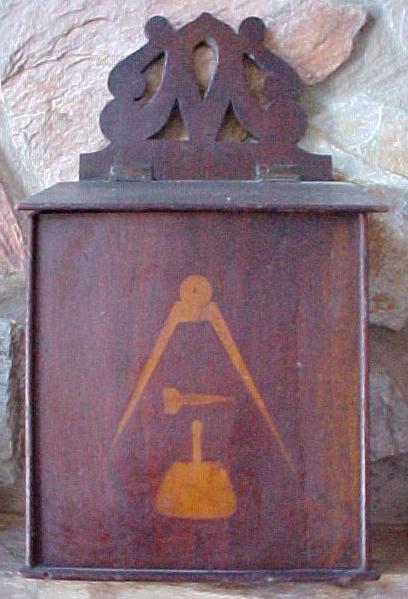1840's Walnut
Inlaid Masonic Salt Box

This early Masonic salt box has
three of the working tools inlaid into the front of the box. Its
original purpose of course was to store salt, but salt also has a symbolic
significance in Freemasonry.
In the Helvetian or Swiss
instructions, salt is added to corn, wine, and oil as one of the elements of
consecration, because it is a symbol of the wisdom and learning which should
characterize a Freemason's Lodge. When the foundation-stone of a Lodge
is laid, the Helvetian ceremonial directs that it shall be sprinkled with
salt, and this formula be used: "May this undertaking, contrived by
wisdom, be executed in strength and adorned with beauty, so that it may be a
house where peace, harmony, and brotherly love shall perpetually reign."
This is but carrying out the
ancient instructions of Leviticus (ii, 13), "And every oblation of thy
meat offering shalt thou season with salt; neither shalt thou suffer the salt
of the covenant of thy God to be lacking from thy meat offering: with all
thine offerings thou shalt offer salt." Significant as are the
references in the Bible to salt, as the rubbing of salt on the new-born child
(Ezekiel xvi, 4); the allusions in Mark (ix,49,50), "For every one shall
be salted with fire and every sacrifice shall be salted with salt. Salt
is good: but if salt has lost its saltness, wherewith will ye season it?
Have salt in yourselves, and have peace one with another." Jesus in
Matthew (v,13) "Ye are the salt of the earth: but if the salt has lost
its savour, wherewith shall it be salted? It is henceforth good for
nothing, but to be cast out, and to be trodden under foot of men."
Salt to the ancient world was pronounced a substance dear to the gods (Plato, Timaeus)
and to break bread and eat salt at a meal with others were symbols of plighted
faith and loyalty.
A special
"Thanks" from Brother Al Lohman, a 30 year collector and 30+ year
Masonic Lodge member from Wisconsin. Al trades on eBay under the User ID
"lochlohman"

